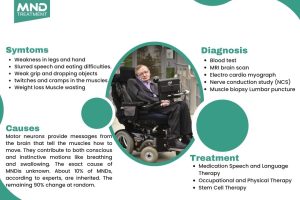
A rare disorder that affects the brain and nerves is known as motor neurone disease (MND). Over time, it worsens the weakness it creates. The effects of MND can be lessened with some therapies, but there is no known cure for the disease. Many years are spent by some people coping with the disease.
Sadly, MND ultimately results in mortality and can severely reduce life expectancy.
Over time, motor neuron disease progressively worsens. Moving, swallowing, and breathing become more challenging, necessitating treatments like a feeding tube or inhaling through a face mask. The length of time it takes for the ailment to get to this point varies greatly. Occasionally, those with motor neurone disease live for decades.
MND Symptoms
Motor neurone disease symptoms often appear gradually and subtly at first. Early indications may include:
- Weakness in legs and hand
- Slurred speech and eating difficulties.
- Weak grip and dropping objects
- twitches and cramps in the muscles
- weight loss
- Muscle wasting
- having trouble controlling your emotions in unsuitable times, such as sobbing or laughing
MND Causes
Motor neurons provide messages from the brain that tell the muscles how to move. They contribute to both conscious and instinctive motions like breathing and swallowing. The exact cause of MNDis unknown. About 10% of MNDs, according to experts, are inherited. The remaining 90% change at random.
MND Diagnosis
MND can resemble other disorders, such as multiple sclerosis, and is therefore frequently challenging for doctors to diagnose in the early stages. A neurologist will do a comprehensive examination and gather a medical history if a clinician suspects that a patient has MND. They could also request testing like:
- Blood test
- MRI brain scan
- Electrocardiomyograph
- Nerve conduction study (NCS)
- Muscle biopsy
- Lumbar puncture
MND Treatment
MND cannot be cured, however, treatment can reduce the disease’s course and increase a patient’s independence and comfort. Drugs, equipment for assistance, and physical therapy can all be beneficial.
MND Treatment selection is influenced by factors like the type of MND and the severity of the disease.
- Medication
The only drug that has demonstrated a survival benefit for those with motor neurone disease is riluzole. By lessening the motor neurone cells’ sensitivity to the nerve transmitter glutamate, riluzole is anticipated to slow down the motor neurone cells’ increasing deterioration. - Speech and Language Therapy
You can learn a number of methods from a speech and language therapist to make your voice as clear as possible. You might require assistive technology as the illness worsens to aid with communication. There are numerous communication tools accessible. - Occupational and Physical Therapy
A person can preserve their mobility and function and learn new ways to carry out particular duties with the aid of physical and occupational therapy. - Stem Cell Therapy
To repair and rejuvenate injured tissues and to encourage immunomodulatory effects, stem cells can develop into nerve cells. By enhancing posture, stability, cognition, and motor control, stem cell therapy and regenerative rehabilitation techniques help people live better lives.
The prognosis for those who have MND varies greatly depending on the condition. Various MNDs can shorten life expectancy. New drugs could potentially halt the progression of MND. In an effort to one day find a treatment, scientists are also looking into the use of stem cells to repair associated damage.
